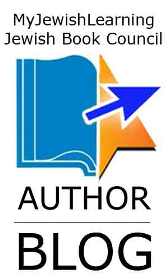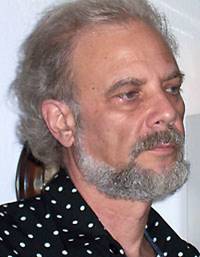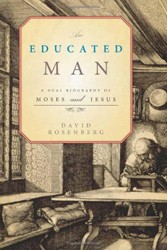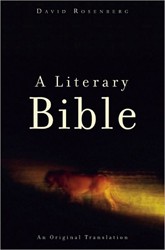In his last post, David Rosenberg, whose latest books are A Literary Bible: An Original Translation and An Educated Man: A Dual Biography of Moses and Jesus
, wrote about writing about writers. He will be blogging all week for the Jewish Book Council and MyJewishLearning.
 We were in the South Miami Barnes & Noble the other day when Rhonda called me over to say that they’ve already got the book in. An Educated Man was sitting cover out — but smack in the middle of the “Christianity” section.
We were in the South Miami Barnes & Noble the other day when Rhonda called me over to say that they’ve already got the book in. An Educated Man was sitting cover out — but smack in the middle of the “Christianity” section.
Oh no, I thought, nobody would be looking in there. It would be like putting Karen Armstrong in Judaica. But then Rhonda reminded me there would hardly be a Judaica section in Dubuque and a thousand other medium-sized cities in North America. Even so, this thought made me feel even more uncomfortable. No, I wouldn’t want to lobby for Judaica sections the way Jewish academics had to once lobby for Jewish Studies departments at universities. As it is, in most places largely Christian, the few Jewish books can be lumped together with Buddhist and Hindu tomes under “Eastern Religion.”
So it came to me that what we need is something altogether nonexistent and counter-intuitive: a “Judeo-Christianity” section, for some of the books in Judaica and some in Christianity that are more broad-based — and where history starts in Jewish history, or at least acknowledges it as bedrock. Reading in this section requires a Hebraic cosmic theater. Even the Pope’s bestseller biography of Jesus could go there, since it makes a large effort to excavate Jesus’s Jewish background, as well as withholds a cross from the cover. Furthermore, it does not proselytize. It could sit right next to Thomas Mann’s Joseph and His Brothers and Moshe Idel’s last book, Ben: Sonship and Jewish Mysticism. Eclectic it may sound, but just think, every new Jewish book and every new Christian book about to be published would have to be rethought: Can it fit in “Judeo-Christianity”? And before these books are even written, the thought of a potential fit there could alter, however slightly, an author’s consciousness. Best of all, it would render the strictly Jewish and Christian sections more self-conscious, as they should be.
Of course I am dreaming. Better to start with building the argument from scratch, and that’s what I’ve hopefully begun in An Educated Man.

David Rosenberg
In more recent history, poet Adam Kirsch’s fresh biography of Disraeli exposes Jewish and Christian relations in 19th-century England, while poet Grace Schulman goes further back, in two scintillating essays on Biblical books she includes in her new volume, First Loves and Other Adventures. Each of these books belongs with An Educated Man on a newly minted Judeo-Christianity shelf, which encourages a broad education, yet one based in Jewish history.
I rest my case, though surely the guardians of the status quo will object that I am muddying the religious waters. On the contrary, by strengthening self-consciousness, we enlarge our cultural perspective. It is, after all, a deeply Jewish matter when we dig into the historical authors of the Bible and just who — what kind of writer and reader — was their ancestral author Moses. And when some officials complain that we should only care about the “text” and not how it came to be, I wonder: Would they give the same advice to their grown children, not to look back on family history but to swallow it on face value?
A sentence from Phillip Lopate’s touching new study, Notes on Sontag, haunts me. He writes of his college days at Columbia: “I had a foolish adolescent-atheist animus toward religion as a subject, not yet understanding its possibilities as a gateway to cultural study,” which he suggests was a reason he did not enroll in Susan Sontag’s course in Religion. But Sontag’s emphasis on the cultural was reductive; her argument was with an existential interpretation of Christian thinkers, starting with Paul and Augustine, thus hanging our Jewish antecedents out to dry. Indeed, the Jews of ancient (and modern) Israel and Judea only existed for Sontag as a home to run away from — how else can one attain the glamour of exile, in which she self-identified as “an international Jew?”
This is beautifully argued in David Gelernter’s seminal new book, Judaism: A Way of Being. Gelernter is from a parallel universe of the Ivy League (Yale rather than Columbia), arguing that “the Bible’s eye for (and obsession with) deep psychological truth is uncanny.” He goes on to evoke that uncanniness as has rarely been seen since Rosenzweig’s Star, and ultimately he turns Sontag’s exilic fantasy inside-out: “Throughout the long Diaspora Israel would show its devotion to its Creator — and to its childhood home.”
Yet now we are grown up, Gelernter continues, and we know that the expression “you can’t go home again” was also a Sixties generation fantasy. Israel, as the biblical exemplar of “home,” exists today precisely as a universal testament to complex historical fact; however fraught its existential situation, it requires a creative stance both canny and uncanny — a self-awareness that a Susan Sontag never had to employ.
In An Educated Man, I probe beyond cultural meaning to the border between natural and supernatural worlds. A typical border-town ambience exists there: everyone is thoroughly confused but too intoxicated to notice. Anything can be had for a price, except honor — and the Torah, our historical guide to honor. Speaking of price, I’m put in mind once again of the Torah’s writers and those Jewish writers who came after, myself included. A friend reminded me of a pious midrash that warns not to make a profit from Torah. If factual, then the sages could not have tolerated writers per se, but only in disguise, such as writers of commentary. Let me reply as I do in my book, but this time outside of the lives of Moses and Jesus, each of whom I have evoked as a writer. First, this midrash comes from an era in which the Hebrew Bible was already canonized and the memory of its original authorship by ancient Hebraic writers long forgotten. The earlier writers lived in a Hebraic culture perhaps more sophisticated in its borrowings from world cultural history. They could read, translate and transform from many languages and genres. So these biblical writers had to be among the educated elite and thereby have no problem making a living (one hopes). A modern fad in history-telling, however, focuses on ancient life in terms of the “average” person, under the subject heading “daily life.” And yet, the educated elite were also part of daily life, so why does their education still go unexamined? It’s somewhat uncanny, don’t you think? Because Jewish culture has a long historical emphasis on education. So that is one aspect of the cultural mystery I had to dig into, in detail, in An Educated Man.
And that’s why I’ve taken pains as well to give context to the literary educations of Moses and Jesus, and not only to the writers who came after. They too were among an elite — in Joshua Ben Joseph of Nazareth’s (Jesus’s) case, among the fifty thousand educated souls in Galilee alone. Why should we expect less, when his broad range of allusion to historical sources is written into the New Testament? And my reply to the “profit” motive is that making “a living” is a different thing altogether. Even the rabbis of the Talmud made a living from teaching, bare as it may have been. And if not, then they were supported by their communities, perhaps by alms, as some clergy are today. But the earliest biblical writers, living for the most part in a broad-based national culture, had a wider range of patronage, in particular by the royal government as court writers. And the schools of the prophets who came after were no doubt patronized by many communities, elite and average alike.
Now that you know I have to stand as a writer beholden to a public community — peopled namely by you, the readers — what should I expect of your own educations? The answer, I hope, will be in my next post.
David Rosenberg’s newest books, A Literary Bible: An Original Translation and An Educated Man: A Dual Biography of Moses and Jesus
, are now available. He will be blogging all week for the Jewish Book Council and MyJewishLearning.
The Writer of Writers
The Judeo-Christianity Section
A Travel Tip

